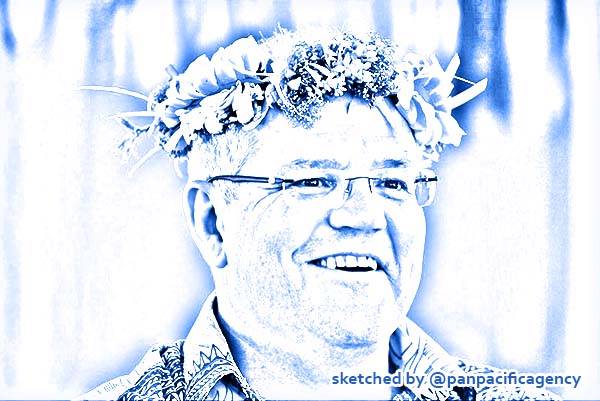[Analytics] China wins another round in the Pacific

Australian Prime Minister Scott Morrison arriving for the Pacific Islands Forum in Tuvalu. Photo: AFP via Australian Prime Minister’s Office/Adam Taylor. Sketched by the Pan Pacific Agency.
China has moved swiftly to capitalize on divisions in the Pacific over climate change at an acrimonious summit in Tuvalu, offering a regional “step up” initiative to counter cash handouts by Australia and New Zealand. Alan Boyd specially for the Asia Times.
Beijing’s Pacific ambassador Wang Xuefeng told delegates to the Pacific Islands Forum (PIF) gathering that their demands for stronger action on carbon emissions to halt rising seas were “legitimate” and his country would be “a good friend, partner and brother of Pacific Island countries.”
“China will also step up its efforts in South-South co-operation and do its best to make a positive contribution to the sustainable and green development of Pacific island countries and jointly rekindle confidence in global cooperation against climate change,” Wang said in his speech.
He did not give any details of what this might entail, but officials of some island nations said they have been offered Chinese aid to build up defenses against encroaching seas and to promote environmentally sustainable policies.
Australia made the same offers in a US$338 million package of assistance announced on the eve of the summit, but it got a cold shoulder from 17 Pacific countries because there was no offer to cut carbon emissions that some low-lying island nations blame for climate change impacts.
Hopes that the 18 participating countries might heal their widening rift on the issue quickly faded in a heated 12-hour debate by national leaders on August 16 that even reduced Tonga Prime Minister Samuela Akilisi Pohiva to tears.
Despite an impassioned plea by Tuvalu leader Enele Sopoaga, the summit’s host, Australian Prime Minister Scott Morrison vetoed several sections of a joint communique, as did New Zealand’s leader Jacinda Ardern. These included all references to coal and efforts to set specific emission targets.
Morrison also refused to back a separate statement issued by small island nations who belong to a sub-section within the PIF that demanded all nations commit to phasing out the use of coal in their power sectors.
“It’s not incumbent on any member state to endorse that statement, it’s a statement of the small Pacific states,” Morrison argued. The communique will be presented to next month’s United Nations Climate Action Forum.
China has the highest carbon emissions of any country in absolute terms, along with the United States, but was oddly not singled out for any criticism in Tuvalu. Australia and the US have the biggest emissions per population.
American and Australian officials privately described Beijing’s stance as “hypocritical”, while denying there was competition for influence in the region. Morrison said he was committed to the “Pacific family of nations.”
“We will keep doing this because it is in Australia’s national interest to support a secure and stable Pacific region,” he declared on Twitter today (August 17). “That is what the last few days in Tuvalu have been all about.”
However, other Pacific nations signaled that it would not be business as usual in their relations with Australia, confirming Canberra suffered a substantial diplomatic setback at the summit as it tries to counter China’s aid offensive in a region it has long considered its sphere of influence.
The Pacific Western bloc, led by Australia and the US, has tried to counter China’s ascendancy by drawing island nations into security partnerships, partly to prevent China from opening naval bases of its own. But they have failed to realize that island nations see climate change as their key security threat.
Pacific nations also did not support the geopolitical arguments espoused by Australia and the US in Tuvalu. Samoan leader Tuilaepa Malielegaoi, whose nation is considering switching its allegiance from Taiwan to China, said he would not take sides, as “their enemies are not our enemies.”
Beijing is viewed as a desirable partner because it is less judgmental than the Western powers, which often package aid with stipulations on the treatment of human rights, labor standards and other democratic requirements.
Fiji Prime Minister Frank Bainimarama, whose country was ostracized by Australia and New Zealand in 2009 for refusing to call elections after a 2006 coup, accused Morrison of being heavy-handed in the summit debate and trying to impose Australia’s political will on the region. He said Canberra’s approach would push Pacific nations closer to China.
“After what we went through with Morrison, nothing can be worse than him. China never insults the Pacific,” he told The Guardian. “They [Australians] keep saying the Chinese are going to take over. Guess why? You don’t have to be a high-school graduate to know that,” he said.